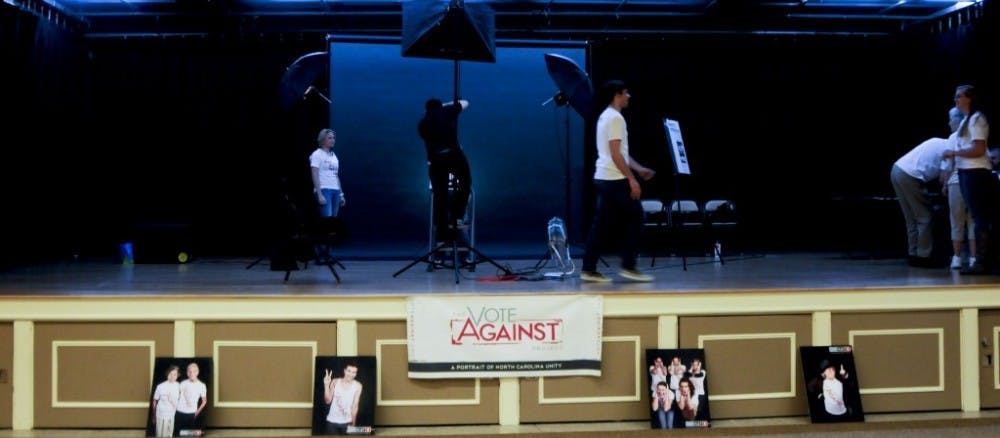Little commonality existed among the subjects of the photographs. Only a white shirt united them all, but with the click of a button and bright flash, Elon University students added their face to the Vote Against Project. The creator of the Vote Against Project visited Elon April 5, the last stop for the Vote Against Project college tour.
The organization exhibits a collection of photographs featuring people wearing a shirt that says "Vote Against," encouraging North Carolina voters to vote in opposition to Amendment One, which bans legal recognition of all unmarried couples, May 8.
"I knew these images showing all types of love was going to automatically bring the people in and help them understand what this amendment is about," said Curtis Brown, the creator and photographer for the Vote Against Project.
Brown uses his experience in photography to communicate the controversy surrounding Amendment One and demonstrate the extent of its potential influence. While the amendment is often presented as a gay-marriage issue, if passed the amendment affects numerous heterosexuals as well. The amendment reserves health care, insurance, visitation rights and protection from domestic abuse for married couples.
"There are so many different types of people taking photos, and people don't realize the different types of families that are in North Carolina and the different families that are already affected by discrimination in North Carolina law as well as this amendment that's coming up," said Raafe Purnsley, a member of SPECTRUM who was instrumental in bringing the project to campus.
While the language of the amendment prohibits same-sex marriage, it also limits the rights for those in domestic partnerships, civil unions and single parents. The 2010 Census indicates 220,000 couples in North Carolina are in committed relationships, although unmarried. Of those unmarried couples, 18,000 are gay, meaning 12 percent of those affected by this amendment identify with the LGBTQ community.
"It affects straight people more than the gay community," Brown said. "No gay can get married if it passes or if it doesn't pass. If it doesn't pass, there's still a law in North Carolina saying that they can't get married."
Although Brown said he was not previously invested in politics, the possible implications of Amendment One pushed him into action.
"When I understood something this big was going to be put on the ballot, I couldn't be quiet and hope my next-door neighbor or friend was going to make the change for me," he said.
While the photo shoot attracted students to the project, voter registration was a large component of the tour as well. University students, even those not residents of North Carolina, are still able to register to vote so long as they have lived in the state for at least 30 days.
"We can show that college campuses are at the forefront of getting people to open their mind to the different types of people out there and changing the political atmosphere," Purnsley said.
Sophomore Katie Goulah attended the photo shoot, pointed her fingers at the camera and showed the state her opposition to the amendment.
"I think it is a really important amendment and the more people that hear about it will go out and vote," she said.
Although Goulah said she knew about the amendment before attending the event, her understanding of the amendment focused on the gay-marriage component. Other students that participated in the photo shoot described the amendment in terms of its influence in the LGBTQ community as well.
"I just really support the cause because I have family members that are gay and they should have the right to marry the person they love," said sophomore Louise Orr, who also had her photo taken for the Vote Against Project.
Brown said he his happy with the student reaction to the project, and he hopes voters acknowledge the various groups the amendment, if passed, will influence.
"If you're voting for or against, I respect your decision," Brown said, "as long as you are voting 100 percent with an understanding of what the amendment is actually about."
Editor's Note: According to tweets from the Vote Against movement, Elon had the highest number of participants - 305 - of any college they visited.


